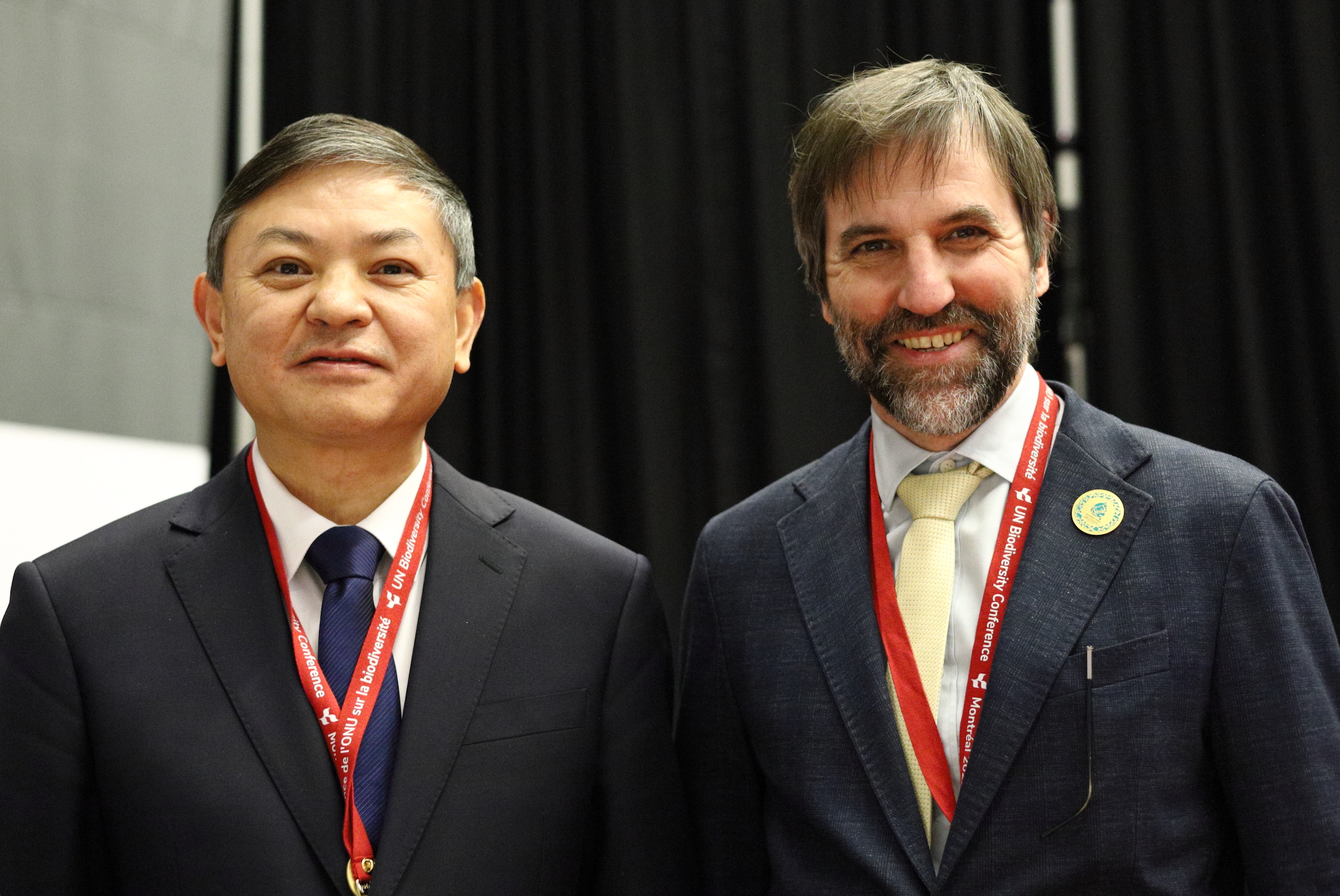Support strong Canadian climate journalism for 2025
Canada is the first country to kick money to a new fund designed to breathe life into a global pact to protect nature, but before the fund can be tapped by those who need it, others will have to step up.
On Thursday, at the once-every-four-year meeting of the Global Environment Facility (GEF) — a multibillion-dollar pot of money from rich countries that help developing countries meet environmental goals — a new program called the Global Biodiversity Framework Fund (GBFF) was launched in Vancouver.
The GBFF is to support the goals of the Kunming-Montreal Global Biodiversity Framework (GBF) — a Paris Agreement-style pact for nature — signed at last year’s COP15.
But before the GBFF can be accessed by developing countries and Indigenous Peoples, it needs to hit a minimum of US$200 million from three donor countries, explained acting executive secretary of the Convention on Biological Diversity (CBD) David Cooper in an interview with Canada’s National Observer. The CBD is a 30-year-old international treaty that organizes the world’s biodiversity goals.
Canada’s $200-million contribution (US$147 million) represents roughly 75 per cent of the minimum threshold. The only other country to publicly commit funds Thursday was the United Kingdom, with a US$17-million pledge. There remains an approximate US$40-million gap needed from at least one other country.
“Now the pressure should be on other donors to also help cross the line,” Cooper said, adding the U.K. has signalled it would contribute more funding next year and Japan is signalling it will follow suit.
“For meaningful programming of the fund, we'll need a lot more than (US$200 million),” he said. “More on the levels of a billion I think we'll need to see in 2024 so that there are sufficient funds.”
Canada’s $200-million pledge to the fund is not new money. Rather, it’s an allocation from a $350-million pledge announced by Prime Minister Justin Trudeau at COP15 — the UN’s biodiversity summit held in Montreal last year — to advance biodiversity goals globally. According to some experts, Canada’s decision to contribute to the new fund is an attempt to fill a vacuum of leadership on the global biodiversity file.
This new fund “is critical so that developing countries and Indigenous Peoples can access funding and implement their goals,” Environment and Climate Change Minister Steven Guilbeault said. He added he believes it will be a “key factor” in the world’s efforts to stop and reverse biodiversity loss by 2030 — the target year countries agreed to at COP15.
The new fund is designed to make the GBF agreed to last year possible by helping countries and Indigenous Peoples pay for nature protection. The GBF commits countries to protect 30 per cent of land and oceans by 2030, recognizes Indigenous leadership as a central pillar of achieving these goals and reaffirms Indigenous Peoples’ right to free, prior and informed consent to development projects on their territories. It includes a call to support poorer countries with US$200 billion to protect nature by 2030, including US$20 billion per year between now and 2025 and US$30 billion per year after that until the end of the decade from rich countries.
Finance is the lifeblood of the agreement. Without money to pay for nature protection, those conservation targets would fall by the wayside like previous international conservation targets, according to experts.
Canada’s National Observer has reviewed 21 letters sent on behalf of Guilbeault and International Development Minister Ahmed Hussen to finance and environment ministers of countries including the United States, China, Brazil, India, Germany, France and others. The letters gave notice that Canada would contribute to the fund and asked others to step up.
“We hope that you will join us in announcing a contribution… If not, we hope you could consider an initial contribution as soon as possible before the end of 2023, considering your national circumstances, to build confidence and ensure the GBFF’s success,” the letters say.
Guilbeault has skin in the game after taking political heat for his close collaboration with China to land that agreement. Political opponents have pounced on that ongoing working relationship as tensions between China and western countries grow.
A spokesperson for Guilbeault’s office said climate change and nature protection negotiations always speak of urgency, but given the wildfires on display and other extreme impacts of climate change the world is witnessing, urgent rhetoric needs to be reflected in “something concrete.”
“Political leadership requires having front-runners,” the spokesperson said. “That's a key message that Minister Guilbeault is trying to bring through not just making the pledge, but also making sure that he tries to work with other countries so that same sense of urgency and concrete action is shared across other contributor countries, which is why it was not just pledging but asking other countries to follow.”
Climate Action Network Canada senior international policy analyst Pratishtha Singh told Canada’s National Observer the $200 million pledge is a welcome move by Canada.
“One of the things that was lacking in the (Convention on Biological Diversity) space for long was the political leadership from the countries to talk about the biodiversity crisis,” she said. “The announcement today I think will send a strong signal of solidarity, especially to Global South countries and also encouraging peers like other rich nations to contribute to the fund.”
Despite the US$200 billion by 2030 goal countries have agreed to, the United Nations Environment Program (UNEP) has said some estimates peg the global biodiversity funding gap at US$598 billion to $824 billion per year by 2030 and US$4.1 trillion by 2050. While high, the UNEP says those estimates are achievable, pointing to US$133 billion worth of nature-based solution financing today.
“These investments need to at least triple by 2030 and increase four-fold by 2050 from the current level,” according to the UNEP.






Comments
I need some assistance in understanding an apparent truism: it seems nothing can be done on the policy side without a big chunk of gov't money first allocated, then spent. Why is that? What happened to simply implementing a (hopefully thoughtful) policy, at no cost to gov't (but often obvious cost, downstream, to various actors, depending on subsequent reaction to the policy).
For example, a provincial gov't can implement new rules for settlement design without costing a penny beyond salaries to prepare the documents and pass them into law. A federal govt can implement new fuel efficiency standards for vehicles. Any gov't can set aside crown lands as protected wilderness (or to rewild degraded crown lands).
None of that costs a cent in capital cost.
I differentiate the cost of something from the opportunity cost of doing/ not doing something. Further, there would obviously be operational costs for, e.g., a rewilding program.
There is, for example, an obvious (short-term) opportunity cost to set aside virgin crown forests to be protected as, e.g., a wildlife corridor. But, what about the long-term costs, in the context of a biodiversity crisis – not to mention a sustainable local economy -- of allowing those forests to be cut?
So, why wait for gov'ts to stockpile dollar commitments before actually doing anything? Is it related to the entire (absurd, IMO) effort to place market valuations on every aspect of nature? Is it a policy chill caused by so many investor protection mechanisms in various agreements or an aversion to being seen as "anti business"? Is it simply that many politicians, in fact, don't care about ecology or much of anything beyond acquiring as much wealth, for themselves or their pals, as possible? (I do believe that Minister Guilbeault, for one, does, in fact, care). Is it a fear of the unknown? Is it “we must leave it to the market” thinking?
This notion of gov't handwringing and "can't do anything without a pot of money"-thinking is puzzling.
If the money is to actually alter economies, it seems to me that would take a great deal more $$$ than a couple of billion. There are 8 billion people, the vast majority of the planet’s land has been human-terraformed https://www.google.com/search?q=what+percentage+of+the+planet+surface+h…, hundreds of millions of people draw down ocean resources. Someone explain how a few billion will make a difference?
The alternative is policy which will act as a ship's wheel to change the direction of the boat (hopefully not the Titanic); the responses to the policy – expected or not, intended or not – will result, in fits and starts, as billions of humans make changes, large or small.
I welcome informed views.
A 2022 book that I'm reading has some terrific ideas complementary to and, indeed, informing the above.
Buller, Adrienne. "The Value of a Whale: On the Illusions of Green Capitalism". Manchester University Press.
I'll quote a couple of passages from ch 1.
"...the neoliberal framework for governance. Though the term is so regularly and variably used as to have lost some of its meaning, as historian Quinn Slobodian articulates, the neoliberal project was a purposive effort to insulate the economic sphere from interference by democratic demands, which neoliberals viewed as damaging to economic prosperity and growth. Beginning in the 1970s and enduring over the past several decades, the framework of neoliberal statecraft and governance has produced an artificial separation between the political and the economic through a strategic ideological, intellectual and political effort. Its architects described a system of ‘double government’, with one set of laws, norms and institutions for the market, and another for the political. As Slobodian writes, the aim and effect of this division – leaving some sovereignty over domestic social affairs to nation-states while limiting sovereignty over the economic sphere – was to ‘satisfy mass demands for self-representation while preserving the international division of labour and the free search for profitable markets.’
Many elements of the ‘neoliberal consensus’ will be recognisable: the privatisation of public assets and services in the UK under Margaret Thatcher; President Reagan’s ‘regulatory relief’ agenda; the crushing of organised labour on both sides of the Atlantic; the deregulation of finance in the world’s financial hubs (namely London and New York); and the pursuit of an increasingly liberalised, global marketplace wherein capital and finance move freely in their pursuit of returns. But where common sense on neoliberal governance has often misconstrued it as an approach based on a small state and limited government ‘interference’, to the contrary, neoliberalism has both built new and reworked existing institutions and intellectual and legal architectures ‘to encase the global market from interference’ from the sovereign nation-state and the democratic populace.. As David Harvey summarises, "neoliberalism can be understood as: A theory of political economic practices that proposes human well-being can best be advanced by liberating individual entrepreneurial freedoms skills within an institutional framework characterised by strong private property rights, free markets, and free trade. The role of the state is to create and preserve an institutional framework appropriate to such practices.""
"The project of green capitalism is intellectually enabled by the work and the enduring intellectual authority of market-centric economics and statecraft, which serve to present the prevailing economic arrangements and systems as somehow natural, inevitable and unassailable. The impact of this tunnel vision has been profound: by viewing the world through the lens of a narrow set of economic imperatives, the influence of market-centric economics has been to fundamentally alter the way the state functions and society understands itself – from our relations to each other to our position in the natural world."
I heartily recommend the book.
Thank you Ken for sharing this excerpt. His summary of neoliberalism brought so many apparent conflicts into focus and gave clarity. I now see it less as a hijacked system and more one where we have to press the right levers to find balance and a sustainable future.